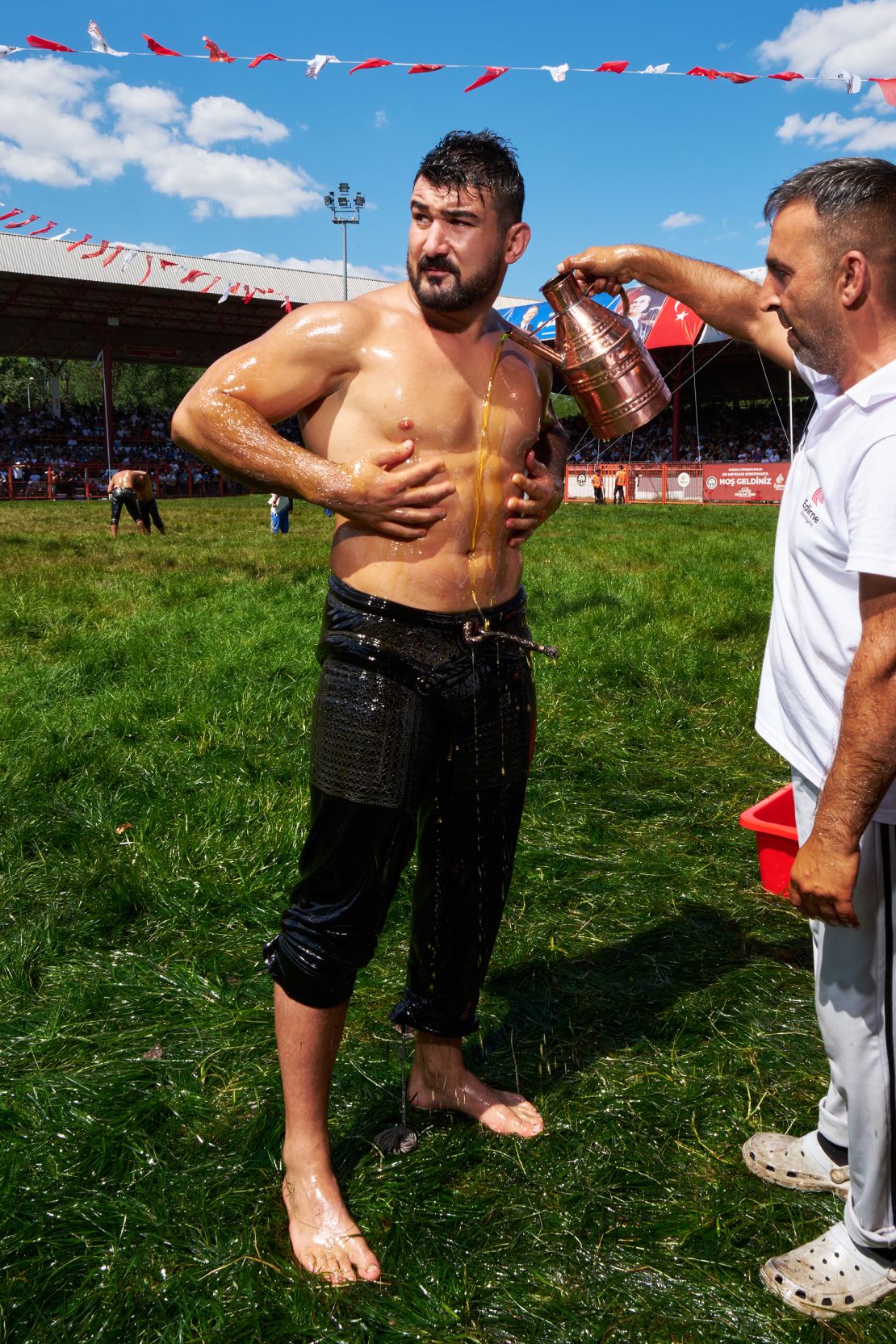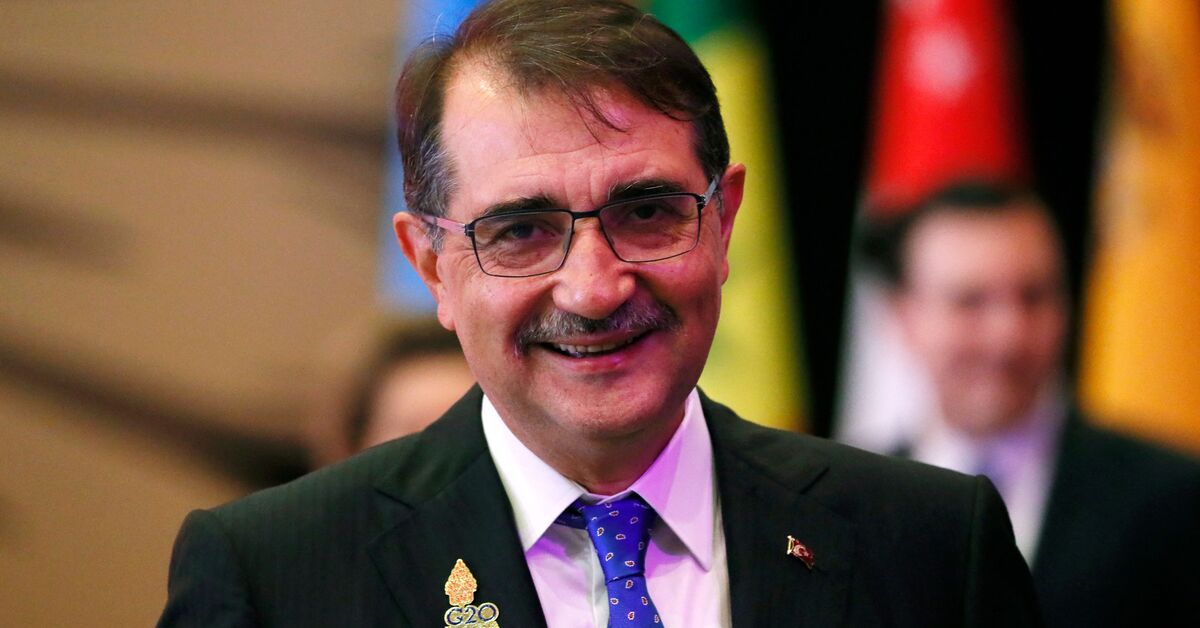Chiseled gladiators, tight leather pants, and copious amounts of olive oil: Inside Turkey’s ancient oil wrestling festival | CNN
Editor’s Note: This CNN series is, or was, sponsored by the country it highlights. CNN retains full editorial control over subject matter, reporting and frequency of the articles and videos within the sponsorship, in compliance with our policy.
Edirne, Turkey
CNN
—
Under a pop-up tent on a sunbeaten patch of grass, a shirtless Cengizhan Koca is bent over a pair of black leather pants in prayer. But more than just prayer alone is needed to wriggle into the stiff-looking trousers emblazoned with his family name. He pours a bottle filled with a mixture of water and olive oil into the pants, and then with a few firm tugs on the waistband and a wiggle of the hips, he’s in.
Koca is one of hundreds of wrestlers competing at this year’s Kirkpinar Oil Wrestling Festival in northwestern Turkey. Chiseled young men from all over the country, and even abroad, have come to compete in one of 15 age and weight classes.
The sport is similar to regular wrestling, except here, the competitors are covered head to toe in olive oil. There are no mats either – the matches all take place in an overgrown grassy field inside a stadium – and more than a dozen fights take place simultaneously, each with their own referee.
This year, there are only 752 wrestlers, down from roughly 3,500 who took part in an open competition in 2023. The sport’s governing body told the Anadolu Agency state-run news service that qualifying requirements were added this year to cement Kirkpinar’s status as “the Olympics of oil wrestling” – but the move has been controversial with some competitors, according to local media.

The event in Edirne, just a stone’s throw from the Greek border, is even older than the modern iteration of the Olympic Games. Originally conceived by 14th century Ottoman Sultan Orhan Ghazi as a way to keep his troops in shape for battle, the annual tradition has carried on through the generations and now holds the Guinness World Record for “oldest continuously sanctioned sporting competition.”
This year is the 663rd tournament. For many wrestlers, the sport runs in the family. Koca’s father and uncle were wrestlers here too; now his brothers and cousins all compete.
“Wrestling comes first in our lives. I mean, we almost do nothing but wrestle,” he said. “Everything is wrestling. It’s like an inheritance left to us by our father.”
His first-round opponent, Abdullah Basar, also has the sport in his blood.
“Why do I do this sport? Because, I am taking after my father, my grandfather, and my ancestors,” Basar said. “And of course, we hope that the next generation will carry on the tradition too.”
Even before the oil started flowing, pomp and pageantry welcomed the wrestlers, with the sound of drums and traditional Turkish flutes accompanying local officials through the streets of Edirne, in the shadow of the comparatively young, 450-year-old Selimiye Mosque.
Among the dignitaries is this year’s ceremonial grand marshal – a heavy-looking gold belt draped over one shoulder – an honor bestowed on whoever offers up the largest donation to the tournament. This year’s donation was well over $250,000, according to Andalou.
Next year’s grand marshal has reportedly pledged more than $1 million.
‘Blood and sweat’
After the procession stops at the town square to honor modern Turkey‘s founding father Mustafa Kemal Ataturk, (who established the country 562 years after the tournament began), it heads to the local cemetery. Here, participants’ prayers give a nod of respect to wrestlers past. A few hours later, centuries of tradition come to life through wrestlers present.
Before the bouts begin, “oilers” cover each competitor in the slippery cooking lubricant. The prize money for each competitor is relatively modest – around $17,000 for the winner of the top category – but this year, the real cash is in the olive oil itself, as global prices for the golden liquid skyrocket. A five-liter can of extra virgin these days can easily top $60, but Edirne’s mayor, Filiz Gencan Akın, insists the price of oil is no threat to the longevity of the sport.

“Of course, olive oil is a must for this sport. But we don’t see it as a cost, but as an investment in keeping our ancestral sport alive forever,” she told CNN.
Koca and Basar are familiar foes. The pair faced off a few weeks ago at another tournament. Koca lost. They’ve both spent months preparing for this day.
“We got here through hard work, we shed blood and sweat,” said Koca.
With the battle drums beating in the background, the pair briefly hold hands, before being called on to begin. The new wave of competitors march onto the field in the traditional manner, hands slapping down on high knees with each step. A brief silent prayer and it’s game on.

The olive oil makes it almost impossible for wrestlers to get a grip on their opponent unless they get hold of their pants. An arm down the trousers in this sport is completely within the rules.
For more than half an hour Koca and Basar battle it out. Eventually Basar wears down his opponent and lifts him up in a bear hug for just long enough to end the match. After the referee raises his arm to signal he’s the victor, Basar immediately walks over to console his distraught opponent.
“My friend was upset, I tried to make him feel better, but this is wrestling. I told him, ‘I’ve won today, but you will win tomorrow,’” he said to CNN after the match.
In the tent next door, Koca is found sitting on a mat looking dejected – oil-soaked pants still on. “I feel like everything is over now,” he said. “I was emotional because I had high hopes. I wanted to make my family proud because so much effort and expense has been put into this, and I’ve failed on day one.”
Basar went on to finish second in his weight class, taking home a $300 prize.
For Koca, the tournament ended early, but the ancient sport itself seems poised to last at least another six centuries.
“This is a sport that existed before the Republic of Turkey was founded and has become a tradition that we have continued ever since,” Akin, the mayor, told CNN. “If you ask how this continues for so long, it is entirely a matter of passion.”
Guray Ervin and Tanem Zaman contributed to this story



